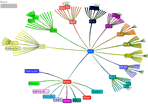Innovation Network In Animal Reproduction
ANIMAL BIOTECHNOLOGY IN THE SELECTION, MULTIPLICATION, BIOLOGICAL SAFETY, INTERCHANGE AND DISSEMINATION OF GENETIC RESOURCES IN DIFFERENT PRODUCTION SYSTEMS AIMING AT COMPETITIVENESS OF NATIONAL LIVESTOCK 01/2009
Characterization of the Problem Focused by the Network Project
Increasingly demanding consumers and meat and milk production systems pressured by other segments of agriculture, clearly establish that the research challenge is focused on the increase in productivity, cost reduction and food quality improvement. The production itself (actions before the "gate") is built on classic pillars of animal production: genetic, sanitary, nutritional component, handling and reproduction. The range of assumptions, quality and costs is directly related to the production system and the adoption of technological innovations by the productive sector. In a general way, the large and “mega” livestock-oriented enterprises demand and adopt state of art technologies, the same not occurring among those with a small-scale production, although important to the country's total production. Within that context, the Network proposes to assist in developing technology options that can meet different production systems in the different Brazilian ecosystems, without losing sight of the quality of the product and the pay of the country man.
As great challenges justifying the proposal of the Network it is possible to list:
- 1. To elaborate a program instrument with the purpose of ordaining on a more efficient way the different research actions, development and innovation, associated to the assisted reproduction technologies and related areas such as genetics, health and nutrition;
- 2. To foster actions to promote the identification and the dissemination o f higher genetic material, and the development of models for milk and meat exploitation in the different ecosystems, with the due health safety; 2) to develop innovating technologies capable of improving the Brazilian livestock competitiveness;
- 3. To provide the country with laboratory infrastructure and skilled human resources capable of quickly responding to the market demands;
- 4. To level the technological status among the different species of zootechnical interest (bovine, ovine, caprine, bubaline, equine and swine);
- 5. To generate basic knowledge and in related strategic areas, which shall drive the agriculture sector, as well as other sectors, such as human health.
The development of several reproduction biotechnologies, such as the artificial dissemination (AD), super ovulation (SOV), collection and transfer of embryos (TE), in vitro production of embryos (VPE), cloning by Nuclear transfer (NT) and transgenic organism, may greatly contribute with the programs of animal improvement (Franco & Melo, 2006).
As regards sanitary issues, although the main focus of the Network is on the control of diseases in donor/recipient animals of embryos and in the biological safety of semen, oocytes and embryos, the possibility of producing animals more adapted to ecosystems and production systems, shall lead to a reduction in the use of inputs such as food and drugs, contributing to the final quality of the product.
The nutritional features approached in the project are intended to the improvement of the reproductive function and the quality of the gametes and embryos, which allows a greater efficiency in the processing and use of this genetic material.








